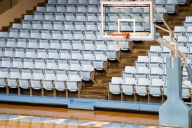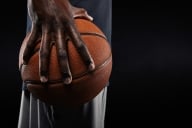You have /5 articles left.
Sign up for a free account or log in.
Iowa State University officials' fight to keep a former basketball player off the court has stalled, after the State Supreme Court declined to intervene in a case that's now sitting in district court.
Iowa State's Board of Regents had appealed to the state's high court after a district court judge issued a stay on Yempabou (Bubu) Palo's expulsion from the team. With Friday's court order, the stay remains in effect until the district court schedules a hearing.
Until then at least, Palo, who was kicked off the team in January after he was charged with sexually assaulting a fellow student, is eligible to participate and compete.
Universities and the National Collegiate Athletic Association always argue that playing sports is a privilege, not a right. But cases like these conflict with that assertion.
"Once a right is involved, the bar for due process can go up substantially," John Infante, a former compliance officer and author of the Bylaw Blog, wrote before the state Supreme Court denied Iowa State's appeal request. "The implications, even just in one state, would be immense. Can a court force a university to travel and play a student-athlete? Could athletes sue over admissions decisions, grades, or good standing decisions? Would it expose the NCAA Manual to judicial review?"
It appears that those questions will remained unanswered for now. But the case has created an unusual conflict between the campus and courts, experts say.
The alleged assault occurred one night in May 2012, when a female student who is no longer at Iowa State says she asked Palo and his friend for a ride home. Instead, she says, they drove her to the friend's house, where they both sexually assaulted her. Palo was charged with second-degree sex abuse in September 2012, and kicked off the team after a finding of conduct violation by the university's office of judicial affairs.
Then in January 2013, the criminal charge was dropped and Palo was reinstated to the team.
A campus appeals process left the decision in the hands of Iowa State President Steven Leath, who in August upheld the finding that Palo had violated the student conduct code, and after having played 17 games, Palo was again booted from the team. The university's Board of Regents upheld Leath's decision in December, in an additional appeal filed by Palo.
Palo, a fifth-year redshirt senior, had one last shot -- appealing to a district court -- and the judge issued the stay last month. The university's board appealed to the State Supreme Court, which on Friday denied the request to intervene.
Now, the case is sitting in district court.
Deference and Liability
The fact that Palo's case has made it this far is unusual, experts said, because courts tend to defer to universities in disciplinary matters.
"It's really an educational decision that's being made," said Chris Loschiavo, president of the Association for Student Conduct Administration. "Judges don't like to substitute their judgment for that of the faculty and staff who really are in the best position to determine a student's ability to matriculate through the institution and ultimately graduate."
There are also serious liability implications. If university officials know or suspect that a student poses a danger to others and doesn't take action, the institution could be liable under Title IX.
In 2009, the Arizona University System agreed to pay a victim $850,000 and hire high-ranking women's safety employees after a football player who had been expelled for groping, threatening and exposing himself to women was brought back to campus at the request of a coach, only to rape a female student in her dorm room.
"This gives you the entire framework of what could happen if [Palo] transfers to another school and commits sexual assault there," said Kathy Redmond Brown, executive director of the National Coalition Against Violent Athletes. "That's something Iowa State should be applauded for, the fact that they could have kept this guy on based on a judge's ruling, but they continued to appeal it."
Under Title IX, university courts are required to use a lower standard of evidence than criminal courts do, so it's not unusual for conduct boards to punish a student for violations even when separate charges are dropped. But athletes are often placed on interim suspension when charges are filed, then reinstated when the charges are dropped -- as they often are in sexual assault cases because of the difficulty of proving a crime -- or the athlete agrees to a deal. (Jameis Winston, the Heisman Trophy-winning quarterback who led Florida State University to a national championship title this year, was never disciplined; there was no campus judicial hearing, and the state never brought charges.)
There is an additional layer of complexity at play, which is cited in the district court's ruling: Palo says Heath, the Iowa State president, waited too long to issue a final decision and caused Palo to miss by five days the NCAA deadline to transfer and finish out his final season at another institution. That point was cited in the district court's ruling. But Iowa State officials say Palo's lawyers neither raised questions about the anticipated timing of Leath's decision, which they knew could come after the deadline, nor requested an NCAA transfer waiver.
The district judge also asked why, if Palo posed a threat to the university, he was reinstated briefly after the criminal charges were dropped -- not to mention allowed to stay on campus as a student in good standing. The judge also questioned the thoroughness of the university's investigation and handling of Palo.
Iowa State Athletic Director Jamie Pollard said in a statement following the district court's stay that officials were "disappointed" in the decision.
"We believe the university should have the sole right and responsibility to determine any student's participation in extracurricular activities at Iowa State University," Pollard said.
It seems Palo's eligibility is in the hands of the district court now. Gene Marsh, a lawyer in collegiate and professional sports at Jackson Lewis P.C., a Birmingham, Ala., law firm, declined to comment on Palo's case specifically. But he said one thing is certain.
"Universities have and will continue to make decisions on their own staff, faculty and students -- retention and dismissal -- based on standards that are lower than those required to get a prosecution in criminal conviction matters," Marsh said in an email. "That concept is demonstrated frequently across the country in all kinds of matters, without regard to whether the student is an athlete."








